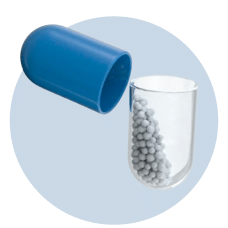Gliford 5 Tablet
Prescription Required
Product introduction
Gliford 5 Tablet is a medicine used to treat type 2 diabetes mellitus in adults. It belongs to a group of medicines called sulfonylureas and helps control blood sugar levels in people with diabetes. This helps to prevent serious complications of diabetes like kidney damage and blindness.
Gliford 5 Tablet may be used by itself or along with other medicines. It should be taken with food. Take it regularly at the same time each day to get the most benefit. Your doctor will decide what dose is best for you and this may change from time to time according to how it is working.
Keep taking this medicine, even if you feel well or your blood sugar levels are controlled. If you stop it without consulting your doctor, your blood sugar levels could rise and put you at risk of kidney damage, blindness, nerve problems, and loss of limbs. Remember that it is only part of a treatment program that should also include a healthy diet, regular exercise, and weight reduction as advised by your doctor. Your lifestyle plays a big part in controlling diabetes.
The most common side effects of taking this medicine include nausea, headache, and dizziness. It can also sometimes cause low blood glucose levels (hypoglycemia). Make sure you recognize the signs of having low blood glucose levels, such as sweating, dizziness, headache, and shaking, and know how to deal with it. To prevent this, it's important to have regular meals and always carry a fast-acting source of glucose such as sugary food or fruit juice with you. Drinking alcohol can also increase your risk of low blood sugar levels and should be avoided. Some people may find that they put on weight with this medicine.
You should not take it if you have type 1 diabetes mellitus, if you have diabetic ketoacidosis (high levels of acid in your blood), or if you have severe kidney or liver disease. Before taking this medicine, tell your doctor if you have ever had heart disease, thyroid disease, or some hormonal conditions. It may not be suitable. Pregnant or breastfeeding women should also consult their doctor before taking it. Your blood sugar levels should be checked regularly and your doctor may also advise blood tests to monitor your blood cell counts and liver function.
Gliford 5 Tablet may be used by itself or along with other medicines. It should be taken with food. Take it regularly at the same time each day to get the most benefit. Your doctor will decide what dose is best for you and this may change from time to time according to how it is working.
Keep taking this medicine, even if you feel well or your blood sugar levels are controlled. If you stop it without consulting your doctor, your blood sugar levels could rise and put you at risk of kidney damage, blindness, nerve problems, and loss of limbs. Remember that it is only part of a treatment program that should also include a healthy diet, regular exercise, and weight reduction as advised by your doctor. Your lifestyle plays a big part in controlling diabetes.
The most common side effects of taking this medicine include nausea, headache, and dizziness. It can also sometimes cause low blood glucose levels (hypoglycemia). Make sure you recognize the signs of having low blood glucose levels, such as sweating, dizziness, headache, and shaking, and know how to deal with it. To prevent this, it's important to have regular meals and always carry a fast-acting source of glucose such as sugary food or fruit juice with you. Drinking alcohol can also increase your risk of low blood sugar levels and should be avoided. Some people may find that they put on weight with this medicine.
You should not take it if you have type 1 diabetes mellitus, if you have diabetic ketoacidosis (high levels of acid in your blood), or if you have severe kidney or liver disease. Before taking this medicine, tell your doctor if you have ever had heart disease, thyroid disease, or some hormonal conditions. It may not be suitable. Pregnant or breastfeeding women should also consult their doctor before taking it. Your blood sugar levels should be checked regularly and your doctor may also advise blood tests to monitor your blood cell counts and liver function.
Uses of Gliford Tablet
Side effects of Gliford Tablet
Most side effects do not require any medical attention and disappear as your body adjusts to the medicine. Consult your doctor if they persist or if you’re worried about them
Common side effects of Gliford
- Hypoglycemia (low blood glucose level)
- Nausea
- Headache
- Dizziness
How to use Gliford Tablet
Take this medicine in the dose and duration as advised by your doctor. Swallow it as a whole. Do not chew, crush or break it. Gliford 5 Tablet is to be taken with food.
How Gliford Tablet works
Gliford 5 Tablet is an antidiabetic medication. It works by increasing the amount of insulin released by the pancreas in order to lower blood glucose.
Safety advice
Alcohol
UNSAFE
It is unsafe to consume alcohol with Gliford 5 Tablet.
Pregnancy
SAFE IF PRESCRIBED
Gliford 5 Tablet is generally considered safe to use during pregnancy. Animal studies have shown low or no adverse effects to the developing baby; however, there are limited human studies.
Breast feeding
SAFE IF PRESCRIBED
Gliford 5 Tablet is probably safe to use during breastfeeding. Limited human data suggests that the drug does not represent any significant risk to the baby.
Monitor the breastfed baby’s blood sugar during treatment with Gliford 5 Tablet
Monitor the breastfed baby’s blood sugar during treatment with Gliford 5 Tablet
Driving
CAUTION
Your ability to drive may be affected if your blood sugar is too low or too high. Do not drive if these symptoms occur.
Kidney
UNSAFE
Gliford 5 Tablet is probably unsafe to use in patients with kidney disease and should be avoided. Please consult your doctor.
Liver
CAUTION
Gliford 5 Tablet should be used with caution in patients with liver disease. Dose adjustment of Gliford 5 Tablet may be needed. Please consult your doctor.
Use of Gliford 5 Tablet is not recommended in patients with severe liver disease. They can experience very low blood sugar levels while taking this medicine.
Use of Gliford 5 Tablet is not recommended in patients with severe liver disease. They can experience very low blood sugar levels while taking this medicine.
What if you forget to take Gliford Tablet?
You should skip a dose of Gliford 5 Tablet if a meal is skipped, and add a dose of medicine if you eat an extra meal.
All substitutes
For informational purposes only. Consult a doctor before taking any medicines.
Gliford 5 Tablet
₹1.11/Tablet
Glybovin 5 Tablet
Aristo Pharmaceuticals Pvt Ltd
₹1/tablet
10% cheaper
Glycozen 5mg Tablet
Elder Pharmaceuticals Ltd
₹0.89/tablet
20% cheaper
Daonil Tablet
Sanofi India Ltd
₹1.73/tablet
56% costlier
Euglucon Tablet
Abbott
₹1.18/tablet
6% costlier
Glinil Tablet
Cipla Ltd
₹1.07/tablet
4% cheaper
Quick tips
- Take it shortly before or with the first main meal of the day (usually breakfast). Avoid skipping meals.
- Be careful while driving or operating machinery until you know how Gliford 5 Tablet affects you.
- It can cause hypoglycemia (low blood sugar level) when used with other antidiabetic medicines, alcohol or if you delay or miss a meal.
- Always carry some sugary food or fruit juice with you in case you experience hypoglycemic symptoms such as cold sweats, cool pale skin, tremor and anxiety.
- Your doctor may check your liver function regularly. Inform your doctor if you develop symptoms, such as abdominal pain, loss of appetite, or yellowing of the eyes or skin (jaundice).
- Gliford 5 Tablet helps decrease high blood sugar level and avoid long-term complications of diabetes.
- Take it shortly before or with the first main meal of the day (usually breakfast). Avoid skipping meals.
- Exercise regularly, eat a healthy diet and take your other diabetes medicines (if prescribed) alongside.
- It can cause hypoglycemia (low blood sugar level) when used with other antidiabetic medicines, alcohol or if you delay or miss a meal.
- Always carry some sugary food or fruit juice with you in case you experience hypoglycemic symptoms such as cold sweats, cool pale skin, tremor and anxiety.
- Monitor your blood sugar level regularly while you are taking this medicine.
- Be careful while driving or operating machinery until you know how Gliford 5 Tablet affects you.
- Your doctor may check your liver function regularly. Inform your doctor if you develop symptoms, such as abdominal pain, loss of appetite, or yellowing of the eyes or skin (jaundice).
Fact Box
Chemical Class
Second-generation sulfonylurea derivative
Habit Forming
No
Therapeutic Class
ANTI DIABETIC
Action Class
Sulfonylureas (Insulin Secretagogues)
Patient concerns
FAQs
Is Gliford 5 Tablet the same as Glipizide?
No, Gliford 5 Tablet and Glipizide are different medicines. However, they belong to the same class of medicines called sulfonylureas and are used to treat type 2 diabetes mellitus in adults.
Does Gliford 5 Tablet play any role in the treatment of polycystic ovarian syndrome (PCOS)?
No, Gliford 5 Tablet is not known to have any role in the treatment of polycystic ovarian syndrome (PCOS). Also, there is no clinical evidence available regarding the same.
Why should Gliford 5 Tablet be used cautiously in elderly patients?
Gliford 5 Tablet should be used with extra caution in elderly patients because they are at high risk of getting low blood sugar (hypoglycemic event).
Is Gliford 5 Tablet useful in the management of prediabetes?
Gliford 5 Tablet is not used for the management of prediabetes, a condition with blood glucose levels higher than normal but not high enough to label you as diabetic. There are clinical studies available, but the evidence is not strong enough for its use in prediabetes.
How is Gliford 5 Tablet different from Teneligliptin?
Both Gliford 5 Tablet and Teneligliptin are antidiabetic medicines and control blood sugar levels effectively. However, they work in different ways and may show different kinds of side effects. Gliford 5 Tablet commonly causes hypoglycemia and weight gain while Teneligliptin causes headache and nasopharyngitis. Teneligliptin causes hypoglycemia when used along with insulins or sulfonylureas and does not cause weight gain.
Can I skip Gliford 5 Tablet for a few days?
No, Gliford 5 Tablet should not be skipped as it can make your diabetes worse. If you miss the dose by mistake, take it as soon as you remember.
Can I take Gliford 5 Tablet if I have a sulfa allergy?
Use of Gliford 5 Tablet should be avoided if you are allergic (hypersensitive) to sulfonylureas or sulfonamides or any of the other ingredients of this medicine.
Does Gliford 5 Tablet cause weight gain?
Yes, Gliford 5 Tablet can cause weight gain. It is advisable to closely monitor your diet and exercise regularly while taking this medicine. Avoid skipping your meals as it can cause very low blood sugar levels and you may end up snacking or taking a lot of sugars.
Is there any benefit of taking Gliford 5 Tablet with insulin?
Gliford 5 Tablet, when used with insulin, can help to control high blood sugar levels. Taking them together can help to lower the dose of insulin but there could also be an increased risk of hypoglycemia (low blood sugar levels). The dose of these medicines may need to be adjusted along with regular blood sugar level monitoring. Please consult your doctor if you have any doubts and follow your doctor's instructions carefully to get maximum benefit of Gliford 5 Tablet.
Is it safe to take Gliford 5 Tablet with Liraglutide?
Yes, Gliford 5 Tablet and Liraglutide can be taken together, as they can help in better control of blood sugar levels. However, the risk of low blood sugar levels (hypoglycemia) can increase. Consult your doctor as a dose adjustment of the two may be needed.
Is Gliford 5 Tablet a Thiazolidinedione?
No, Gliford 5 Tablet is not a Thiazolidinedione, it is a sulfonylurea. However, both are antidiabetic medicines but belong to a different group of medicines.
Is Gliford 5 Tablet useful in the management of gestational diabetes?
The use of insulin is advised during pregnancy to control the blood glucose levels. Insulin injections are the standard medication for gestational diabetes. Gliford 5 Tablet may be advised as an alternative or in addition to insulin for the management of gestational diabetes. However, do not start taking Gliford 5 Tablet until prescribed by the doctor.
Does Gliford 5 Tablet cause hair loss?
No, hair loss is not seen with the use of Gliford 5 Tablet. However, diabetes can lead to hair loss. Talk to your doctor if you have excessive hair loss as it could be due to some other underlying condition or it could be a sign of your diabetes getting worsened.
Is it safe to take Gliford 5 Tablet with pioglitazone?
Yes, it is safe to take Gliford 5 Tablet with Pioglitazone in patients with diabetes mellitus. Together these two medicines can control your blood sugar levels, lower plasma lipid levels and improve blood pressure. However, the risk of very low blood sugar levels can increase and the dose of these medicines may need to be adjusted.
Disclaimer:
Tata 1mg's sole intention is to ensure that its consumers get information that is expert-reviewed, accurate and trustworthy. However, the information contained herein should NOT be used as a substitute for the advice of a qualified physician. The information provided here is for informational purposes only. This may not cover everything about particular health conditions, lab tests, medicines, all possible side effects, drug interactions, warnings, alerts, etc. Please consult your doctor and discuss all your queries related to any disease or medicine. We intend to support, not replace, the doctor-patient relationship.References
- Powers AC, D’Alessio D. Endocrine Pancreas and Pharmacotherapy of Diabetes Mellitus and Hypoglycemia. In: Brunton LL, Chabner BA, Knollmann BC, editors. Goodman & Gilman’s: The Pharmacological Basis of Therapeutics. 12th ed. New York, New York: McGraw-Hill Medical; 2011. pp. 1255.
- Nolte MS. Pancreatic hormones and antidiabetic drugs. In: Katzung BG, Masters SB, Trevor AJ, editors. Basic and Clinical Pharmacology. 11th ed. New Delhi, India: Tata McGraw Hill Education Private Limited; 2009. pp. 739-40.
- Briggs GG, Freeman RK, editors. A Reference Guide to Fetal and Neonatal Risk: Drugs in Pregnancy and Lactation. 10th ed. Philadelphia, PA: Wolters Kluwer Health; 2015. pp. 634-36.
Marketer details
Name: Johnlee Pharmaceuticals Pvt Ltd
Address: 42/44, Babu Genu Road, Shop No. 06, 2nd Floor, Om Shanti Co-op Housing Society, Kalbadevi Road, Mumbai-400002. (India)
Country of origin: India
The list of available options shown with the same composition has been prepared upon the advice of registered medical practitioners, pharmacists affiliated with TATA 1MG. TATA 1MG does not promote any pharmaceutical product of any particular company, and all recommendations are based on the medical opinion, advisories from specialist medical and pharmaceutical professionals.
The list of available options shown with the same composition has been prepared upon the advice of registered medical practitioners, pharmacists affiliated with TATA 1MG. TATA 1MG does not promote any pharmaceutical product of any particular company, and all recommendations are based on the medical opinion, advisories from specialist medical and pharmaceutical professionals.
Lab tests offered by us

Related/Popular tests
₹11.1
Inclusive of all taxes
MRP₹11.5 3% OFF
10.0 tablets in 1 strip
SOLD OUT
Notify me
Available options
Available options
Same salt composition:Glibenclamide (5mg)

Same salt composition

Verified by doctors

Popularly bought

Trusted quality
Why buy these from 1mg?







